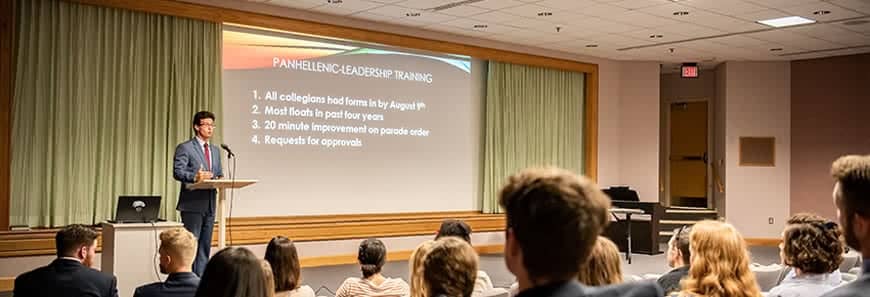
When Pensacola Christian College students hear the words “Panhellenic Council,” very few know their significance. Every semester, 48 students come together to formulate ways to enhance the student experience by directly working with the Four Pillars of Greek Life—Unity, Academics, Leadership, and Service. These students are collegian presidents, often juniors or seniors. Panhellenic Council meets three times a semester and provides leadership advice that collegian presidents can use not only during their time on the council, but for the rest of their lives in their careers.
During the first Panhellenic Council meeting, collegian presidents choose one of six committees that focus on a specific area of student life—academic, event, student unity, leadership, service, or sports. After each collegian president has chosen a committee, they separate into groups to discuss ideas and suggestions about how to improve those areas or introduce new ideas. Some campus-wide suggestions that started in Panhellenic Council include the Brain Bowl, an academic trivia game during the spring; broom hockey becoming a major sport for all collegians; and storage space being provided during Greek Rush preparation in case of rainy weather.

Collegian coordinator Josh Grover works with each collegian president to help them use their role to the fullest extent with their collegian and on the council. “All six of those committees somehow relate to one or more of the Four Pillars. You have an opportunity to voice an opinion or recommendation to those who can help make a change, and those changes then influence the Four Pillars,” he said. “We want to improve our processes. We have to grow. We can’t be stagnant; there’s always room for improvement. The students are a fantastic resource of giving to us how we can improve.”

Tyler Ward (Sr., IN), leader of the Event Committee, didn’t know much about Panhellenic Council or its influence before becoming a collegian president, but he’s working to best use his time on the council. “We talked about how collegians could help improve events like Greek Rush and the Turkey Bowl,” he said. “I love seeing people with all different ideas help contribute to how collegians function on campus!”
The second of the three meetings has committees take their best ideas a step further—planning how they would be implemented. Each committee leader presents ideas that they want to seriously consider and improve, taking questions or concerns that the council as a whole may have about the idea. After learning what areas of an idea need more discussion, each committee then meets separately to efficiently fine-tune their suggestions.
Grover wants Panhellenic Council to become more accessible to students on campus, allowing for practical changes to take place. “I want them to know that if you’re an undergrad, you can meet with your collegian president and say, ‘Hey, I noticed you’re on this subcommittee. I have a recommendation. Would you mind perhaps bringing it up for the next meeting?’ So you as a student can have a voice through your collegian president,” he explained.
During the final meeting at the end of the semester, the Panhellenic Council as a whole will go over what changes or suggestions were brought back for approval. The council then votes on whether or not the suggestion should be implemented in future semesters. “Once Panhellenic Council approves [a suggestion], it’s my job to go through to the different parts of the ministry here at PCC, and make that recommendation become a reality,” said Grover.

Charity Teague (Jr., AL), who leads the Leadership Committee, heard about Panhellenic Council from a friend before she began participating. “The most interesting thing to me about Panhellenic is that the College takes the time to hear from students what they can improve in. We give ideas and talk it through. They take it and see which ones would work,” she said. “Panhellenic Council has great potential to help students have an awesome college experience. I am so glad that the College takes time to see where they can improve student involvement in different areas.”

Although Panhellenic Council is not widely known among students, collegian presidents like Jordan Brenneman (Sr., IN), leader of the Student Unity Committee, want their members to know how they can be involved in providing suggestions. He said, “The effects that we have on the college life on campus, the influence and the potential we have as students to help each other have a better experience, [and] also the changes that have been made to the College will help students see the importance of Panhellenic!”
